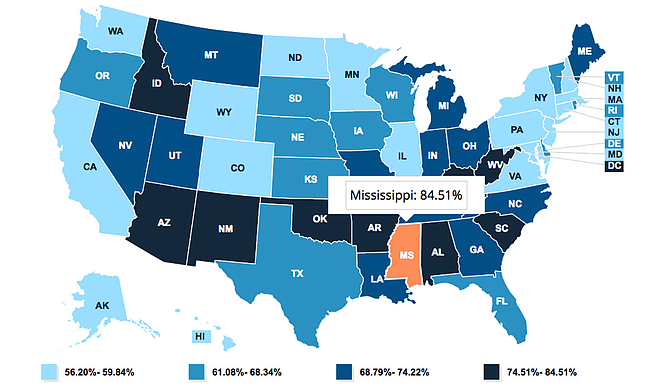Because Mississippi is one of the poorest states in the nation, it receives the most generous portions of federal funding. The federal government currently pays 84.5% of Medicaid expenses in Mississippi. Photo courtesy KFF
JACKSON, Miss. (AP) — One of Mississippi legislators' most important jobs is to keep Medicaid alive beyond June 30, the end of the current state budget year.
Medicaid is a health insurance program for the needy, aged, blind and disabled. It is paid by federal and state money. Because Mississippi is one of the poorest states in the nation, it receives the most generous portions of federal funding. The federal government currently pays 84.5% of Medicaid expenses in Mississippi. The next-largest federal share goes to West Virginia, at nearly 81%.
Medicaid is a big deal to the Mississippi economy. In a state of about 3 million residents, the program covers more than 752,000 people. That is 25% of the population. Medicaid payments help keep hospitals, clinics, pharmacies, nursing homes and other health facilities in business.
Medicaid comes up for review and reauthorization every few years, giving legislators a chance to discuss whether they want to expand or restrict the scope of services or to set potential cost-cutting measures. The legislative session is set to end in early April, so time to reach an agreement is running short.
Earlier this session, senators passed one version of a Medicaid reauthorization bill that would allow women who enroll in the program while pregnant to keep that coverage for up to a year after the birth of a baby. The current coverage is for two months after birth.
The goal in extending coverage is to improve health outcomes for mothers and babies in a state with a high infant mortality rate, said Senate Medicaid Committee Chairman Kevin Blackwell, a Republican from DeSoto County. Health care providers requested the change.
The Mississippi Division of Medicaid temporarily extended coverage to postpartum women who enrolled in the program while pregnant, with no time limit, as a condition of federal COVID-19 relief funding signed last year by then-President Donald Trump. But Blackwell and many other senators are looking for a long-term change.
As of March 1, a pregnant mother with no other children is eligible for Medicaid in Mississippi if her monthly income is less than $2,137. Pregnant girls or women younger than 19 can qualify for Medicaid, regardless of family income. A Kaiser Family Foundation Medicaid Budget Survey found that about 67% of all births in Mississippi in 2017 were covered by Medicaid.
The health care overhaul that then-President Barack Obama signed into law in 2010 gives states the option to extend Medicaid coverage to low-wage earners whose jobs do not provide health insurance. This expansion became available in January 2014, with the federal government paying 90% of the expenses.
Republican-led Mississippi is one of the holdout states against expansion, and critics say the state has hurt rural hospitals by turning away billions of federal dollars. Thirty-six states have accepted expansion, and Missouri and Oklahoma will begin July 1, bumping the number to 38.
The federal relief package recently signed into law President Joe Biden includes incentives for states to expand Medicaid, with a two-year increase in funding. Republican Gov. Tate Reeves is not budging.
“My position has not changed. I am opposed to expanding Medicaid in Mississippi. I am opposed to Obamacare expansion,” Reeves said March 11. “This was a major issue in the governor’s race in both the Republican primary and the general election, and the people have spoken on that issue.”
An interfaith group called Working Together Mississippi issued a letter this month calling for Medicaid expansion, which could make up to 300,000 more people eligible for coverage. It was signed by more than 300 clergy members.
During a March 5 news conference, the bishop of the Episcopal Diocese of Mississippi, the Rt. Rev. Brian Seage said: “God does not ask us at the judgment day if we have decreased the size of government. But God will ask us how we have treated the poor and how we’ve treated the most vulnerable among us."



Comments
Use the comment form below to begin a discussion about this content.
comments powered by Disqus